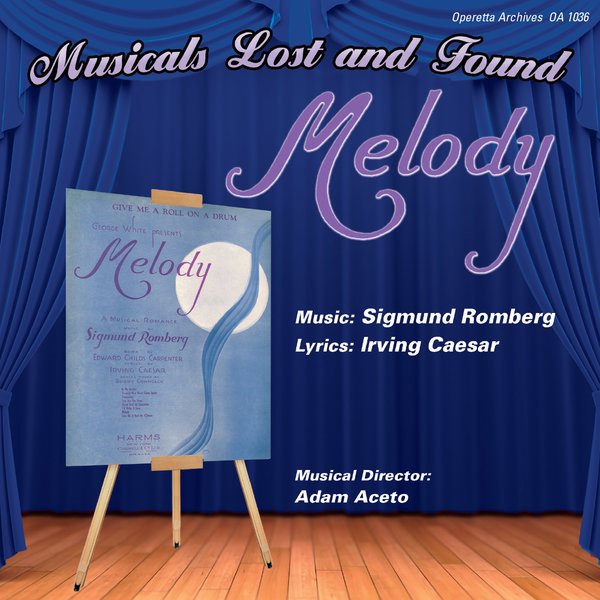John Groves
Operetta Research Center
3 December, 2016
Romberg’s Broadway operettas have not been revived professionally in the UK since matinee idol John Hanson – he of the slicked back jet-black wig – staged The Desert Song and Student Prince in London’s West End and on tour in the late 1960s. As a teenager, I remember seeing both productions, which even then seemed ‘dated’ rather than ‘period,’ especially as each was staged on the smallest budget possible as a vehicle for its star! Both were cloyingly romantic, as is Romberg’s other once well-known show, The New Moon.

Sheet music cover for Romberg’s “Melody.”
The same cannot be said for his 1933 show Melody which must have seemed old-fashioned even back then, not because of its similarities to The Desert Song, but because it owes more in style to Jerome Kern’s Princess Theatre shows, such as Very Good Eddie. This must be partly due to the lyrics of Irving Caesar, exceedingly clearly articulated in this new recording. Caesar’s style differs widely from the words of Oscar Hammerstein and Dorothy Donnelly in the earlier shows. Also, the plot is exceedingly complex, especially for a Broadway show. The libretto is by Edward Charles Carpenter and, in its multi- generational structure, highly reminiscent of Romberg’s 1917 Maytime. Two young lovers cannot get together because of family intervention: a very detailed six page synopsis is given in the booklet.

CD cover for the new cast album of Romberg’s “Melody.”
Musically the show is charming, and, unfortunately, not very memorable. One can understand why the original (and only) production ran for 79 performances. Romberg himself seems not to have thought much of his contribution, as he included none of the musical numbers in the 150 minute retrospective of his music that he recorded for RCA between 1945 and 1951, whereas there are examples from other lesser known scores such as The Blue Paradise (1915), Rosalie (1928), The Night is Young (1935) and My Maryland (1928). These are available on Naxos, and are well worth hearing.
The best numbers in Melody are probably “Give Me a Roll on a Drum” (not a patch on “Stout Hearted Men”), “Tonight May Never Come Again” and “You are the Song,” but the operetta does not possess one song that really sticks in the mind.
The new CD recording gives the show every chance: the roles are all well cast with singing actors who characterize their roles effectively, in spite of the total lack of dialogue, though all underscoring is included. The men are slightly more successful than the ladies in imbuing their songs with individuality, especially Nathan Brian as Pierre and Stephen Faulk as Tristan (!). All sing stylishly and are well, if a bit too closely, recorded.

Operetta crusader Stephen Faulk.
The original orchestrations were by Emil Gerstenberger, who can claim a major role in the success of Romberg’s most well-known shows. The present recording uses two pianists, filling out a vocal score with octave-doubling in the bass and occasional added counter-melodies in the treble: this adds to the feeling that one is listening to an early 1920s Jerome Kern show, but clearly economics forbad the use of an orchestra. Both pianists are very enthusiastic, but the resulting sound is quite percussive, which suits some numbers better than others.
If all this sounds as if I am “damning with faint praise,” then let me add right away: I am not. I am enjoying listening to the show, and I hope that eventually I shall be able to remember some of the melodies!
For more information on the history of the show, click here for an article by Michael Miller from the LA Operetta Foundation. To order the CD, click here.
